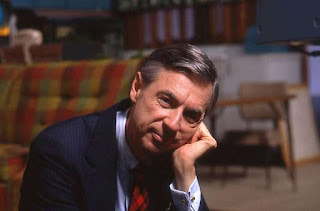Won't You Be My Neighbor?
Fred Rogers was an amazing man. An ordained Presbyterian minister, Rogers decided to go into children’s television in the early 1950’s because he hated the programming that was aimed at young children in those early days of television. Eventually, this would lead to the incredibly popular children’s show, Mr. Rogers’ Neighborhood, which was broadcast nationally (in the U.S.) from 1968 to 2001. But the show actually started in Canada, on CBC, from 1963 - 66, something that isn’t mentioned in Morgan Neville’s documentary, Won’t You Be My Neighbor?
As Won’t You Be My Neighbor? makes clear, Rogers’ slow-paced quiet show broke all the rules for supposedly good TV, but somehow he was able to make an almost magical connection with his viewers that not only made his show popular but resulted in it having a major impact on generations of pre-school children. Rogers’ down-to-earth style and way of talking with and to children about the ups and downs of real life (including divorce and assassinations), without talking down to the kids, was behind that magical connection. The documentary also hints that children were able to pick up on the fact that Rogers was utterly sincere and honest about everything he said to them - this was not a man who was in TV for the wealth or the fame but simply because he wanted to make the world a better place.
I am too old and too Canadian to have had the opportunity to watch Mr. Rogers’ Neighborhood as a child, which is too bad, but I heard a lot of good things about it over the years, which makes me particularly appreciative of the documentary. Won’t You Be My Neighbor? does a great job of telling the vital story of Rogers’ life and the impact of his show. The highlights for me were hearing Rogers speak in various settings over the years, passing along his profound insights into life. A couple of wise quotes that stood out for me:
About TV, he said: “Love is at the root of everything - all learning, all parenting, all relationships. Love or the lack of it. And what we see and hear on the screen is part of who we become.” About his show, he said: “The greatest thing that we can do is to help somebody know that they're loved and capable of loving.”
Won’t You Be My Neighbor? tries to present an honest account of Rogers’ life, including showing his flaws. But these are so minor that they only serve to make Rogers more impressive. He was a man who genuinely lived what he presented to the public (among other things, Rogers was a pacifist, a vegetarian, a feminist and an environmentalist). The biggest criticism of Rogers and his show was that he was so effective in making children feel special that he was partly responsible for entire generations of young adults having a sense of entitlement. That would be an impressive achievement, but the charge is somewhat laughable when you consider the way Rogers’ telling the kids that they are special (unique) and worthy of love was part of a consistent message about caring for and loving others. Indeed, Rogers’ show was often about making goodness attractive.
I did find that the documentary occasionally dragged by getting into too much unnecessary detail about characters in Mr. Rogers’ Neighborhood and this is why I can’t give the film a clear four stars. But Won’t You Be My Neighbor? is a moving tribute to a great man and I recommend it to everyone. ***+ - ****. My mug is up.



Comments
Post a Comment